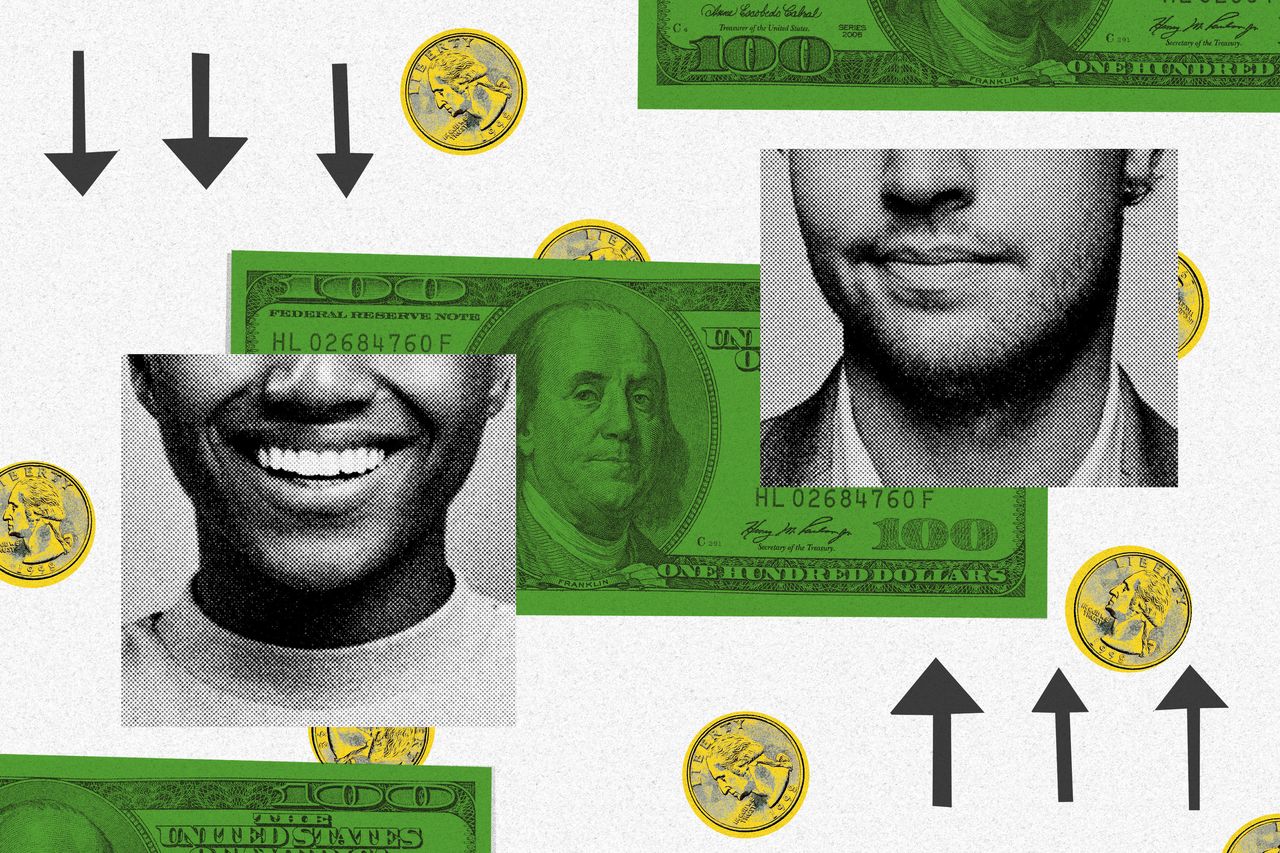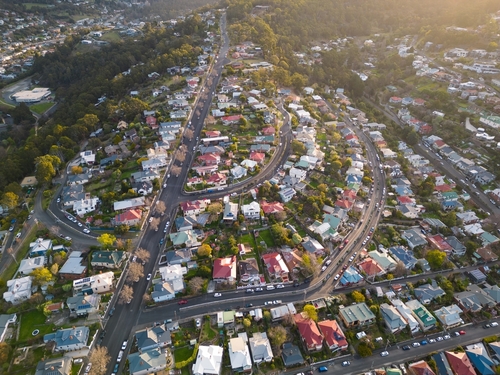The Unexpected Ways a Big Raise Affects Your Happiness
Getting more money often leads to immediate satisfaction. The good feelings might not last.
Up and down the income ladder, people say more money would make them happier. When they actually get it, that isn’t always the case.
Some people who have gotten big raises recently say the money hasn’t changed their day-to-day life or hasn’t provided them as much joy as the things in their life that have nothing to do with money. Others were hoping for a bigger raise or felt conflicted about making more money.
Jess Tapia, a 28-year-old accountant in Hoffman Estates, Ill., thought for years that $90,000 was a salary that would make her happy. When a raise of about $20,000 pushed her pay to that level last February, it did—at first.
To celebrate, Tapia booked a vacation to Germany the next month. The good vibes soon wore off.
“By the time I came back from that trip, it kind of fell flat for me because it was just back to normal, back to the routine,” she said.
The past few years have been good ones for workers seeking higher pay. Median year-over-year wage growth hit a recent peak of 6.7% in summer 2022, after mostly staying below 4% for more than a decade before 2021, according to the Atlanta Federal Reserve. Many of those who switched jobs, or threatened to, made substantial salary gains.
And people with higher incomes do tend to be happier, many studies show. Research looking at lotteries and random cash giveaways indicates that additional money can make people happier for months or even years.
But moving up the income scale, it takes more money to generate the same good feelings, said Jan-Emmanuel De Neve, an economics professor at Saïd Business School at the University of Oxford who studies well-being. The proportion of the increase matters.
“If an employer moves somebody from $15,000 to $30,000, that will have an impact on people’s life satisfaction that is the equivalent of them moving somebody from, say, $60,000 to $120,000,” De Neve said.
More is more
A pay increase that takes someone from financially stressed to financially stable often leads to more happiness. At the low end of the earnings spectrum, a higher income is associated more with squashing negative feelings than producing positive ones, according to a 2021 paper in the journal Proceedings of the National Academy of Sciences.
Randeep Chauhan, a 30-year-old nurse in Ferndale, Wash., went from making about $45,000 in 2021 to $90,000 in 2022 after completing a one-year nursing program.
“Doubling my income didn’t double my happiness, but it came close,” he said.
For Chauhan, much of the happiness boost came from being able to stop worrying about being able to cover his family’s monthly bills. He said his blood pressure dropped to a healthy level after his change in pay, which he attributes largely to the drop-off in financial stress.
If you get a raise, don’t just spend it, said Neela Hummel, a financial planner and the co-CEO of Abacus Wealth Partners.
“The worst thing that can happen with a raise is that that money gets immediately folded into cash flow and a client doesn’t even notice it,” she said.
Many people also jump ahead to how nice a car or how big a house they could afford with a new paycheck. Instead, Hummel advises, take the raise as an opportunity to up your savings or pay down debt.
Chauhan said he has avoided lifestyle creep, putting money toward retirement savings and student loans instead of buying a new computer or phone. “There’s a weird rush in making money and not spending it,” he said.
Austin Benacquisto’s pay has rocketed upward over the past few years. The 29-year-old commercial debt broker in Atlanta made roughly $60,000 in 2019, $110,000 in 2020, $180,000 in 2021 and $325,000 in 2022, including bonuses.
His steps up to $110,000 and $180,000 felt better than the one up to $325,000, he said.
“The last 50,000 I made in 2022 just was for stuff in my house that I wanted,” he said.
Benacquisto’s pay fell to about $200,000 last year as his industry slowed down. The drop felt worse than the recent increases felt good, he said.
“This being the first decrease, it definitely stings,” he said.
The paycheck next door
People’s happiness with their pay is strongly tied to how it compares with the pay of others around them, say researchers who study compensation. Sometimes, those comparisons rankle.
A 30% raise made Ryan Powell less happy at work.
Powell, a 38-year-old finance director for a manufacturer in western North Carolina, received that pay bump in 2022. He had been hoping for more based on the salary information he had heard from recruiters, peers in the industry and his M.B.A. cohort.
The initial thrill of the raise lasted about three months, he said.
“The further I got into it, the more I was realising that I was anchored to the higher number,” he said.
Executives are more likely to leave their companies if their pay is low compared with other top bosses, according to a 2017 study in the journal Human Resource Management.
Comparisons matter closer to home, too. Living in an area where people tend to make more money than you is linked to being less happy, according to a 2005 paper in The Quarterly Journal of Economics.
One reason that Tapia, the accountant in Illinois, isn’t happier after her raises is that she feels guilt about making more money than her parents ever did. Her dad works in construction and landscaping.
“I work from home mostly, I’m comfortable and I’m always indoors. During summertime, he’s sometimes outside working 10 hours in 100-degree weather,” she said.
Tapia recently got another raise of roughly $10,000. She again booked a vacation to Europe but is hoping to extend her joy further this time.
“I’m starting to feel like this is going to plateau, so let me try and make the feeling last a little longer with this trip,” she said.
 Copyright 2020, Dow Jones & Company, Inc. All Rights Reserved Worldwide. LEARN MORE
Copyright 2020, Dow Jones & Company, Inc. All Rights Reserved Worldwide. LEARN MORE
This stylish family home combines a classic palette and finishes with a flexible floorplan
Just 55 minutes from Sydney, make this your creative getaway located in the majestic Hawkesbury region.
Continued stagflation and cost of living pressures are causing couples to think twice about starting a family, new data has revealed, with long term impacts expected
Australia is in the midst of a ‘baby recession’ with preliminary estimates showing the number of births in 2023 fell by more than four percent to the lowest level since 2006, according to KPMG. The consultancy firm says this reflects the impact of cost-of-living pressures on the feasibility of younger Australians starting a family.
KPMG estimates that 289,100 babies were born in 2023. This compares to 300,684 babies in 2022 and 309,996 in 2021, according to the Australian Bureau of Statistics (ABS). KPMG urban economist Terry Rawnsley said weak economic growth often leads to a reduced number of births. In 2023, ABS data shows gross domestic product (GDP) fell to 1.5 percent. Despite the population growing by 2.5 percent in 2023, GDP on a per capita basis went into negative territory, down one percent over the 12 months.
“Birth rates provide insight into long-term population growth as well as the current confidence of Australian families,” said Mr Rawnsley. “We haven’t seen such a sharp drop in births in Australia since the period of economic stagflation in the 1970s, which coincided with the initial widespread adoption of the contraceptive pill.”
Mr Rawnsley said many Australian couples delayed starting a family while the pandemic played out in 2020. The number of births fell from 305,832 in 2019 to 294,369 in 2020. Then in 2021, strong employment and vast amounts of stimulus money, along with high household savings due to lockdowns, gave couples better financial means to have a baby. This led to a rebound in births.
However, the re-opening of the global economy in 2022 led to soaring inflation. By the start of 2023, the Australian consumer price index (CPI) had risen to its highest level since 1990 at 7.8 percent per annum. By that stage, the Reserve Bank had already commenced an aggressive rate-hiking strategy to fight inflation and had raised the cash rate every month between May and December 2022.
Five more rate hikes during 2023 put further pressure on couples with mortgages and put the brakes on family formation. “This combination of the pandemic and rapid economic changes explains the spike and subsequent sharp decline in birth rates we have observed over the past four years,” Mr Rawnsley said.
The impact of high costs of living on couples’ decision to have a baby is highlighted in births data for the capital cities. KPMG estimates there were 60,860 births in Sydney in 2023, down 8.6 percent from 2019. There were 56,270 births in Melbourne, down 7.3 percent. In Perth, there were 25,020 births, down 6 percent, while in Brisbane there were 30,250 births, down 4.3 percent. Canberra was the only capital city where there was no fall in the number of births in 2023 compared to 2019.
“CPI growth in Canberra has been slightly subdued compared to that in other major cities, and the economic outlook has remained strong,” Mr Rawnsley said. “This means families have not been hurting as much as those in other capital cities, and in turn, we’ve seen a stabilisation of births in the ACT.”
This stylish family home combines a classic palette and finishes with a flexible floorplan
Just 55 minutes from Sydney, make this your creative getaway located in the majestic Hawkesbury region.






















